| Srl | Item |
| 1 |
ID:
161053


|
|
|
|
|
| Summary/Abstract |
The paper studies the “Turkish model” in a comparative historical perspective from three angles: as an example of mobilization modernization; as a combination of liberal democracy and Islam; and as a de-Westernization paradigm. The focus is on the transformation of the “Turkish model” and its substantive evolution from the early 1990s to the middle of the 2010s, and on how peaks of international interest in the “Turkish model” impacted Ankara’s foreign policy activities and its positioning on the international stage by Turkish elites. This approach helped to identify the factors behind periodic resurgence and transformation of the “Turkish model” and the shifting balance between the expectations of its potential recipients and Ankara’s plans to use it as a foreign-policy tool. Research methodology is based on the theory of multiple modernities and the concept of symbolic interactionism in international relations. In the case of Turkey, this approach provides broader possibilities for interpreting Ankara’s foreign-policy strategies and understanding the mechanisms of its relations with other countries in the Greater Middle East.
|
|
|
|
|
|
|
|
|
|
|
|
|
|
|
|
| 2 |
ID:
091995
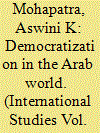

|
|
|
|
|
| Publication |
2008.
|
| Summary/Abstract |
The article argues that the Turkish experience with democracy may not affer a model for democratization of the Arab states in West Asia and North Africa.It begins with a brief account of institutional and political changes in Turkey since establishment of the modern Turkish Republic.It also explains how historical and structural conditions conducive to Turkey's progression to democracy are absent in much of the Arab world.
|
|
|
|
|
|
|
|
|
|
|
|
|
|
|
|
| 3 |
ID:
129925


|
|
|
|
|
| Publication |
2014.
|
| Summary/Abstract |
The Turkish model deemed most relevant to 2011-12 post-Mubarak Egypt was the Islamist-led transformation of the polity and economy that occurred following the rise to power of the Justice and Development Party (AKP) in the 2002 general election. As it transpired, this version of the Turkish model lasted but one year before another took its place. That model was the political project of the Turkish military that seized power in September 1980. This thirty-one year old Turkish model of a constitutionally empowered executive body, controlled by the military appears to have trumped the contemporary, Islamist one in Egypt. But the Turkish military coup of 1980 unwittingly and unintentionally laid the groundwork for the transition that ultimately swept it from power and its leaders into jail. The pertinent question then is will Egypt's civilian political and economic actors be similarly and sufficiently astute to exploit the opportunities they inevitably will have even under military rule? Egyptian political forces will inevitably mount serious challenges as they did in Turkey. In Egypt, however, the domestic and regional political and economic contexts are so different from those in Turkey that the outcome of the struggle for power between civilians and the military are likely to deviate substantially from this Turkish model.
|
|
|
|
|
|
|
|
|
|
|
|
|
|
|
|
| 4 |
ID:
155361
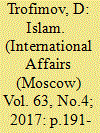

|
|
|
|
|
| Summary/Abstract |
THE WAVES OF DESTABILIZATION in the Middle East that have risen high in recent years, terrorist acts that follow one another, persecution of those who think differently or follow different religions in the Muslim countries and even outside them bring to mind, once more, Prof. Huntington. Indeed, can Islam and violence, Islam and democracy and, in the final analysis, Islamic and non-Islamic values cohabitate within the frames of the steadily globalizing community of men?
|
|
|
|
|
|
|
|
|
|
|
|
|
|
|
|
| 5 |
ID:
156097
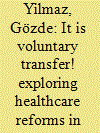

|
|
|
|
|
| Summary/Abstract |
The Turkish healthcare system has been transformed in the 2000s by adopting a comprehensive health model – the so-called Turkish Model. Although Europeanization dynamics were effective in Turkey in recent decades due to the acceleration of European Union (EU) accession process after 1999, healthcare reforms demonstrate a distinct process. This article analyzes the factors behind the health transformation through employing a policy transfer framework. It argues that a parallel process of health-policy transfer with Europeanization in other areas emerged in Turkey, and rather than the EU push, the Turkish healthcare model was a result of voluntary engagement for eliminating problems in this domain.
|
|
|
|
|
|
|
|
|
|
|
|
|
|
|
|
| 6 |
ID:
132527


|
|
|
|
|
| Publication |
2014.
|
| Summary/Abstract |
This article aims to discuss and analyze the emergence and evolution of Turkey's role as a model in the international system in three different periods, 1991-93, 2003-05 and 2010-12. To this end, it methodologically uses the main concepts of role theory: role expectations, role conceptions and role performance. Focusing on K.J. Holsti's example national role conception category in particular, it seeks to reveal the major similarities and differences between the role expectations that have enacted the role conception known as the Turkish model, and compare the impact of these expectations on role performance in each of these three cases. The major argument of the article is that the sustainability of the model's national role conception depends foremost on Turkey's political and economic capabilities that directly influence its role performance.
|
|
|
|
|
|
|
|
|
|
|
|
|
|
|
|
| 7 |
ID:
143415
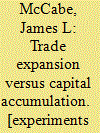

|
|
|
|
|
| Publication |
Cambridge, Harvard University, 1970.
|
| Description |
42p.pbk
|
| Series |
Economic Development Report no.; 161
|
|
|
|
|
|
|
|
|
|
|
|
Copies: C:1/I:0,R:1,Q:0
Circulation
| Accession# | Call# | Current Location | Status | Policy | Location |
| 012498 | 931.04/MCC 012498 | Main | On Shelf | Reference books | |
|
|
|
|
| 8 |
ID:
118264
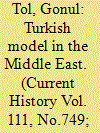

|
|
|
|
|
| Publication |
2012.
|
| Summary/Abstract |
The success of Turkey's democratic experiment and its economic model of high-productivity and export-led growth have contributed to the country's rising image in a region where authoritarian regimes and rentier economies dominate.
|
|
|
|
|
|
|
|
|
|
|
|
|
|
|
|